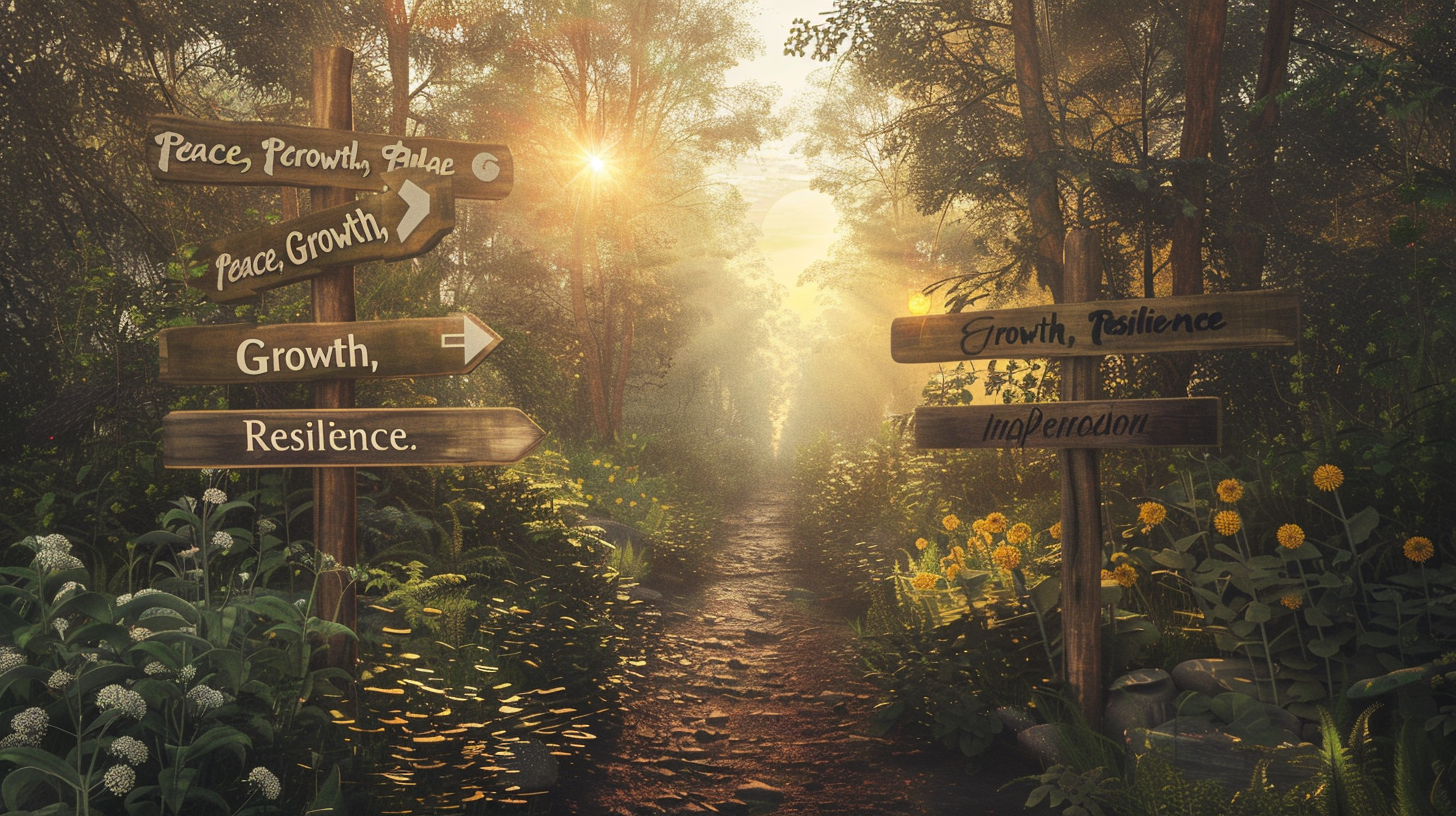Introduction

In today’s fast-paced world, stress has become a familiar, albeit unwelcome, companion for many of us. Its prevalence is undeniable, affecting our mental and physical well-being in profound ways. Persistent stress can lead to a myriad of health issues—ranging from anxiety and depression to heart disease and weakened immune systems. This makes managing stress not just a beneficial act, but an essential one for maintaining overall health and quality of life.
Amidst the chaos of daily responsibilities and pressures, meditation emerges as a beacon of relief. This ancient practice offers a powerful remedy for the modern malaise of stress. Through meditation, you can calm your mind, soothe your body, and restore a sense of balance to your life. It’s a tool that works not by removing the sources of stress, but by changing your reaction to them. Whether it’s through mindfulness, focused attention, or guided imagery, meditation helps forge a pathway to inner peace.
However, starting on this path can be daunting without the right guidance. The world of meditation is vast and varied, and finding trustworthy, expert-vetted resources is crucial for learning effective techniques that truly enhance your life. Recognizing this need, we have carefully curated a list of the best meditation books available. These selections cater to both beginners and seasoned practitioners alike, ensuring that no matter your experience level, you will find valuable insights and practical advice to deepen your practice.
This article promises more than just a simple list; it is a comprehensive guide that will provide you with insights into the top meditation books, explaining how they can aid in stress relief. Additionally, we will explore additional resources that complement your reading and help integrate meditation more seamlessly into your daily routine.
The Profound Impact of Meditation on Stress Relief

In the whirlwind of daily life, stress often feels like an inevitable companion. It’s not just the mental strain we notice—it’s the way our bodies react. Under stress, your body triggers a fight-or-flight response, which was useful in prehistoric times when physical threats were common. Today, however, this response can be triggered by anything from a traffic jam to a work deadline, leading to a cascade of stress hormones like cortisol that can be damaging over time. This constant state of alert can affect everything from your mood to your heart health, setting the stage for chronic conditions.
But what if sitting quietly could change this narrative? Meditation, often viewed with curiosity or skepticism, is actually a powerful tool backed by growing scientific evidence. When you meditate, you initiate a brain process that’s essentially the opposite of the stress response: the relaxation response. Meditation helps to alter your brain’s neural pathways, making you more resilient to stress. It can calm mind chatter and decrease cortisol levels, leading to reductions in anxiety and an overall enhanced state of well-being.
Researchers have mapped these changes precisely. Studies, such as those conducted by major universities and published in reputable journals, show that regular meditation can lead to changes in areas of the brain related to positive emotions, self-regulation, and stress management. These changes are not just psychological but can have a physical manifestation, such as lower blood pressure, improved digestion, and better sleep.
The benefits of meditation extend across both mental and physical realms. Regular practitioners report fewer episodes of anxiety and a significant decrease in symptoms related to depression and other stress-related disorders. Physically, the lower stress levels can contribute to a healthier heart and a stronger immune system.
Consider how these changes could transform your life. Could you benefit from lower stress levels, improved concentration, and better overall health? Imagine handling life’s stresses not just with resilience, but with a sense of calm and focus.
The key to unlocking these benefits is regular practice. The advantages of meditation build cumulatively over time—the more consistently you practice, the more profound the benefits. Meditation is not just an emergency exit you use when stress levels soar; it’s a daily pathway to maintaining overall wellness.
Embrace meditation not just as a technique, but as a lifestyle. Start small, maybe with a few minutes each day, and watch as the practice grows, enhancing your life bit by bit. Your journey to a stress-free, healthier life is just a meditation session away. Ready to start?
Shield Your Mind: Niki Korteweg's Secrets to Stress-Proofing Your Brain | TEDxAmsterdamWomen
Choosing the Right Meditation Book for You

As a seasoned meditation instructor addressing an eager yet diverse audience, it’s crucial to understand that selecting the right meditation book is more than just picking a bestseller off the shelf. The right book serves as a pivotal tool on your journey towards stress relief and personal growth, guiding you through the nuanced landscapes of your mind and emotions.
Why a Well-Chosen Book Matters
Choosing a meditation book that resonates with your specific needs and goals is foundational. A well-selected book can transform your meditation practice from a mere routine into a profound journey of self-discovery and stress relief. It should align with where you are in your meditation journey and where you hope to go, serving as a compass that guides you through both calm and turbulent times.
Criteria for Choosing a Meditation Book
Author Credibility: The credibility of the author is paramount. Opt for books penned by authors who are not only knowledgeable but also have hands-on experience in meditation. Check their qualifications and background in meditation practice—this ensures that the insights and techniques shared are rooted in deep personal experience and expertise.
Approachability of Content: The book should speak to you clearly and directly, irrespective of your prior knowledge of meditation. Look for a style that is accessible and engaging, free from jargon that might cloud the essence of meditation. The language should invite you into the world of meditation, making it approachable and enjoyable.
Practical Exercises: A book that merely discusses meditation philosophically may not serve you as well as one that provides practical, actionable exercises. These exercises should be clearly outlined, easy to follow, and applicable in daily settings, allowing you to practice and experience the benefits of meditation firsthand.
Tips on What to Look for in a Meditation Book
Seek books that balance theoretical knowledge with practical application. This mix helps deepen your understanding while providing you with the tools to practice effectively.
Consider books that include supplementary materials such as audio guides, online resources, or mobile apps. These can enhance your learning experience and provide additional ways to engage with the content.
Read reviews and testimonials from other readers. Their experiences can provide insights into how the book has worked in real-life scenarios, helping you gauge its effectiveness.
As you browse through potential books, ask yourself: What am I seeking from my meditation practice? Am I looking for deep philosophical insights, simple stress-relief techniques, or a structured guide to developing a daily practice? Your answers will guide your choice, ensuring the book meets your personal meditation goals.
Top Meditation Books for Stress Relief: Your Ultimate Guide

Welcome to your journey through the diverse and enriching world of meditation literature. As your guide in this vast library of wisdom, my goal is to help you find the perfect book that speaks directly to your needs in managing stress. Whether you are a curious beginner or a seasoned meditator, the following reviews will introduce you to a range of styles—from mindfulness to Zen to guided imagery—each offering unique approaches to achieve tranquility and stress relief.
1. “Mindfulness for Beginners” by Jon Kabat-Zinn
Synopsis: Kabat-Zinn introduces mindfulness meditation as the art of conscious living. This book breaks down the essence of mindfulness practice in its simplest form, making it an ideal start for beginners.
Key Takeaways: Learn to anchor your attention in the present moment, which is a powerful method for reducing stress and enhancing emotional resilience.
Best Suited For: Beginners who are looking to understand the basics of mindfulness without feeling overwhelmed.
Quote: “Mindfulness means paying attention in a particular way: on purpose, in the present moment, and nonjudgmentally.”
Testimonial: “This book was a gentle introduction to bringing mindfulness into my daily routine, significantly lowering my anxiety levels.”
2. “Wherever You Go, There You Are” by Jon Kabat-Zinn
Synopsis: Expanding on the principles of mindfulness, Kabat-Zinn explores deeper philosophical aspects, encouraging readers to integrate mindfulness into every aspect of their life.
Key Takeaways: Offers practical techniques for harnessing mindfulness throughout the day, from simple breath-awareness exercises to deeper insights on mental habits.
Best Suited For: Intermediate practitioners who are familiar with basic practices and ready to deepen their meditation journey.
Quote: “Mindfulness is not just about sitting down and meditating. Mindfulness is about being aware and awake in every moment of your life.”
Testimonial: “It transformed my practice from a timed session into an all-day awareness.”
3. “The Heart of the Buddha’s Teaching” by Thich Nhat Hanh
Synopsis: Thich Nhat Hanh introduces the core teachings of Buddhism as practical tools for refining mindfulness and compassion.
Key Takeaways: Understand the Four Noble Truths and the Eightfold Path as means to cultivate peace and mitigate stress.
Best Suited For: Those interested in the spiritual dimensions of stress relief and the Buddhist approach to meditation.
Quote: “Peace is every step. It turns the endless path to joy.”
Testimonial: “This book deepened my meditation into a spiritual practice that helps me deal with stress more effectively.”
4. “Guided Mindfulness Meditation” by Jon Kabat-Zinn
Synopsis: This book comes with a series of guided meditation practices on CD, focusing on bodily sensations and mental imagery.
Key Takeaways: Excellent for those who benefit from guided sessions and are looking to develop a regular practice.
Best Suited For: Beginners and those who prefer structured guidance.
Quote: “As you hear these words, as you observe your breath, you are engaging in mindfulness.”
Testimonial: “The guided sessions were exactly what I needed to kickstart my daily meditation habit.”
As you explore these books, consider what you are truly seeking from your meditation practice. Do you need a gentle introduction, a deep philosophical text, or a guided experience? Each book offers a different path to the same destination—peace of mind and stress relief.
Unlock Calm: Top 15 Books to Conquer Stress and Anxiety
Integrating Meditation into Your Daily Life: A Practical Guide

As you begin this path, it’s important to understand that the true power of meditation lies in consistency. Incorporating meditation into your daily routines is not just beneficial; it’s crucial for long-term stress management and enhancing your overall well-being.
Building a Daily Meditation Habit
Setting the Scene: To make meditation a part of your life, start by setting a specific time and place for your practice. This could be a quiet corner of your home in the early morning or a dedicated spot in your living room each evening. The key is consistency.
Starting Small: Begin with short meditation sessions—about 5-10 minutes each day. This is manageable for most people and not overwhelming. As you grow more comfortable with the practice, gradually increase the duration. The goal is to make meditation a non-negotiable part of your daily routine, just like brushing your teeth.
Simple Meditation Exercises to Try
Mindfulness of Breath: This basic exercise can be done anywhere, anytime. Simply focus on your breath. Notice the sensation of air entering and leaving your nostrils, or the rise and fall of your chest. When your mind wanders, gently bring your focus back to your breath. This practice grounds you in the present moment, providing a quick stress relief.
Guided Imagery: During short breaks at work or even at home, take a few minutes to engage in guided imagery. Visualize a peaceful setting, perhaps a quiet beach or a serene forest. Imagine yourself there, experiencing the environment with all your senses. This technique is excellent for resetting your mind and calming your thoughts.
Overcoming Common Challenges
Many beginners struggle with finding time or managing distractions. To integrate meditation into your busy schedule, look for “in-between” moments. Meditate for a few minutes while waiting for your coffee to brew or after parking your car at work. If distractions arise, acknowledge them without judgment and return to your practice.
Engage with Your Practice
Reflect on your daily schedule and identify two or three specific times you could incorporate these meditation practices. How might these techniques help you handle a stressful situation at work or at home? Consider how applying the teachings from your meditation books can make a real difference in your day-to-day life.
Conclusion: Embark on Your Meditation Journey

As we wrap up this enlightening session on the transformative power of meditation for stress relief, it’s crucial to remember the foundational steps that can lead you to a more peaceful and fulfilling life. Choosing the right meditation book is not merely a decision—it’s the first step toward effectively managing your stress and unlocking a new dimension of personal well-being.
Throughout our guide, we’ve explored a diverse range of meditation books, each selected to cater to different levels of experience and personal needs. Whether you are just beginning to explore meditation or seeking to deepen your practice, the right book can serve as your guide, offering not only techniques but also insights that resonate with your personal journey.
The benefits of meditation, as we’ve discussed, extend far beyond momentary stress relief—they encompass profound improvements in both mental and physical health. Consistency is key. I encourage you to choose just one book from our curated list to start with. Let this book be your companion as you build a daily meditation habit that could very well transform your life.
Now, imagine the possibilities that await you as you integrate meditation into your daily routine. Think of this as the beginning of your journey towards not just managing stress but enhancing your entire approach to life. Reflect on what you’ve learned and envision how these practices could elevate your day-to-day experiences. This is your path to personal growth and profound peace.
I urge you, don’t let this moment of inspiration pass without action. Select one of the recommended books and commit to a 30-day meditation challenge. Try the exercises, explore the techniques, and observe the changes in your stress levels and overall well-being. This is your challenge, your experiment, your journey to discover what works best for you.
Share your choice, your experiences, and the impacts you observe. Comment below with the book you’ve chosen and any insights or benefits you notice. This shared journey will not only enrich your own experience but also inspire and encourage others within our community. Your story could be the beacon that lights the way for someone else in their time of need.
This is your moment to take that first step. Embrace it, and let the journey of meditation enrich your life in ways you’ve never imagined.







